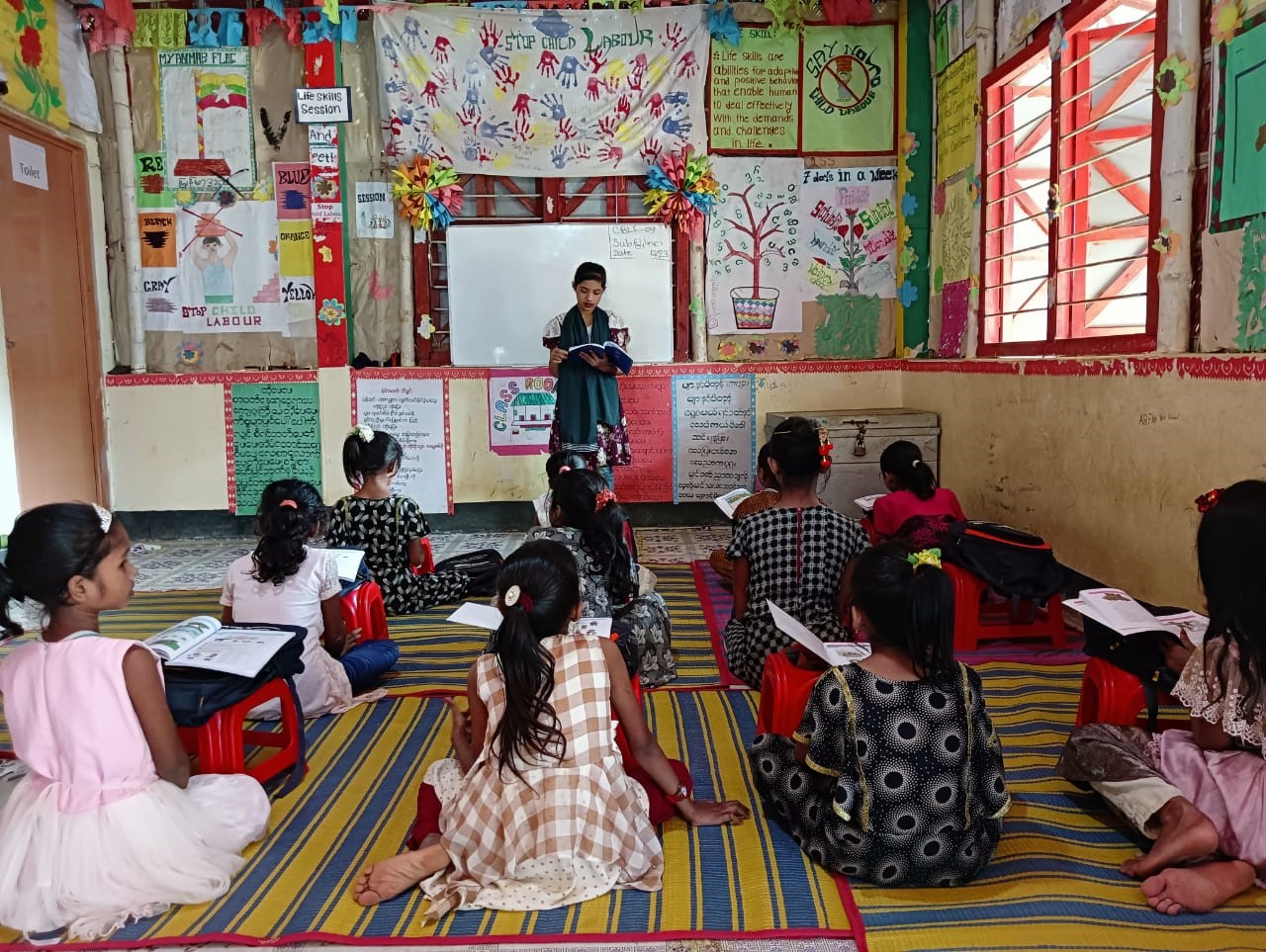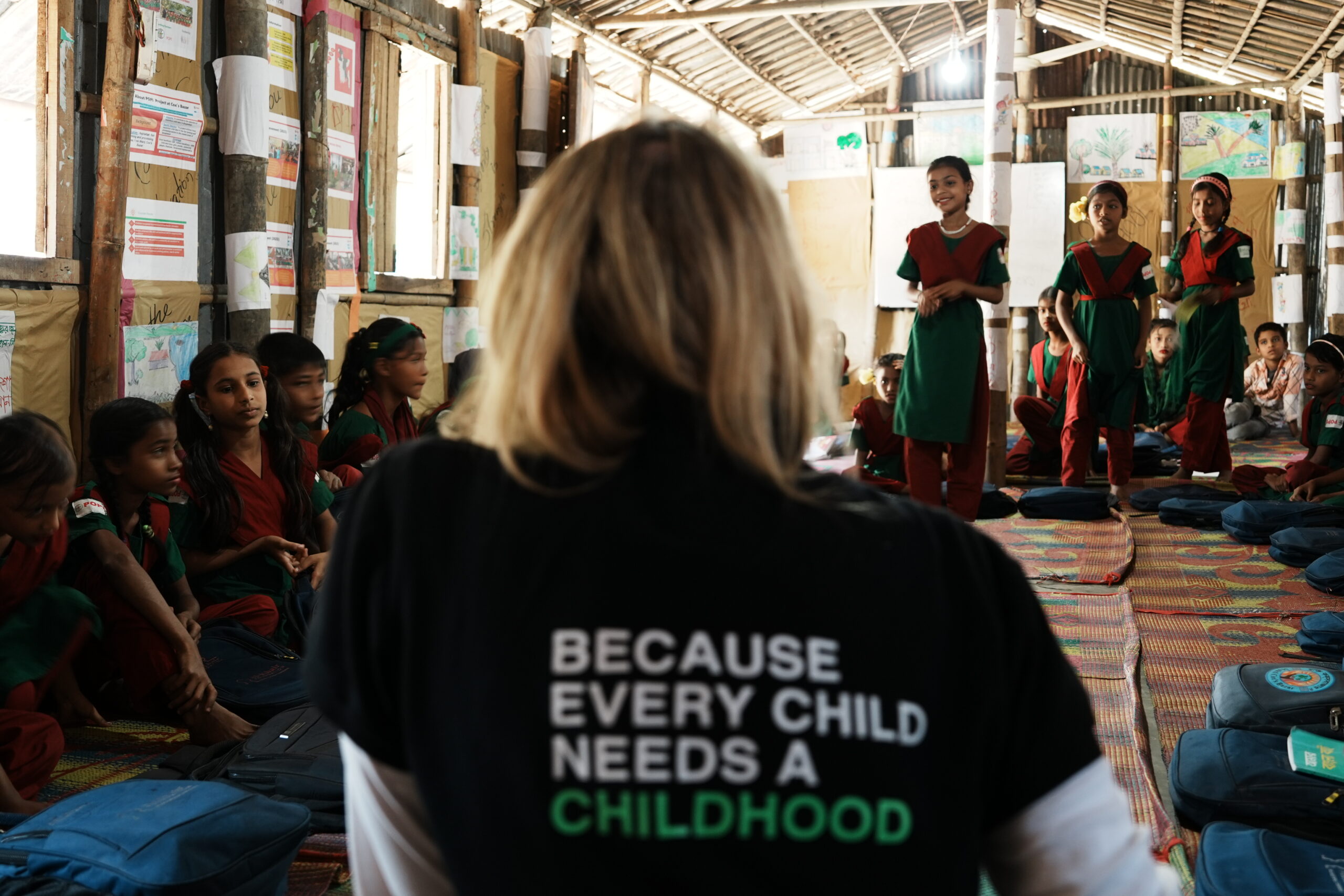Right now, over 500,000 young refugees face crisis upon crisis, their lives at risk and their futures uncertain. But we have the power to help.
Corinne Habel, ChildFund Australia’s Chief Development Officer, recently travelled to Kutupalong refugee camp in Bangladesh. There she met children and young people who dream of a better future for themselves, their families and their communities.
Below Corinne shares more about ChildFund Australia’s work with partner EDUCO to create more safe spaces, and just some of the many extraordinary stories and aspirations of young refugees who continue to fight for their safety and wellbeing.
Basic human needs are not met
“As a mother of four children, visiting the camps was incredibly confronting. Families live on top of each other, overcrowded in temporary shelters constructed with nothing more than some flimsy bamboo and a tarpaulin roof built onto steep, rocky hills. Children sleep, eat and play in a single room with multiple family members, and young people have no privacy. There’s one latrine for every 50 people.
Domestic violence, child labour, early marriage and child exploitation are real threats children face every day. It’s not hard to see why the girls I met consistently listed personal safety as their number one concern.
Formal education and vocational opportunities in the camps are limited, and this hits girls the hardest. Many stop their education when menstruation begins. They are deemed ready for marriage and confined to their shelters.
Breaking the taboos on menstruation
“Menstruation is not a secret thing; it is a natural and healthy bodily process.”

Lily’s Story
Having your period can be tough, but it’s extra difficult for girls like Lily* in Cox’s Bazar. Despite her love of learning, Lily was denied access to schooling due to cultural norms that stigmatise periods. Such beliefs not only hindered her studies but also perpetuated harmful misconceptions about menstruation within her community.
ChildFund Australia together with partner EDUCO are helping to change attitudes towards girls’ hygiene and education in the camps. Volunteer staff spoke with Lily and her mum about the ‘dos and don’ts’ of menstruation at their local multi-purpose centre. These learning facilities give girls like Lily access to education around menstruation – and a platform to challenge prevailing norms.
Armed with a deeper understanding of female hygiene, human rights and gender equality, Lily is now on a mission to help educate other girls about menstrual hygiene and management, and the importance of education.
“I dream that I will complete my study and work to raise awareness about the human rights and lives of the people of my community, especially the girls.”
Israt’s Story
Israt, 13, arrived at Kutupalong camp in Cox’s Bazar when she was just six years old. Now, on the threshold of puberty, Israt wants to take greater control of her life the best she can. This has meant learning more about her body and speaking up for her rights. Specifically, what menstrual and personal hygiene management looks like, which, considered a taboo topic in her culture, was never spoken about at home or with friends.
And she has done this as an active member of her camps’ youth club, held at ChildFund-supported multi-purpose centres. Since joining, Israt has learnt about the dos and don’ts when menstruating, leadership skills, as well as empowering other girls in her community to be aware and talk about their health and hygiene.
Today, Israt runs monthly club meetings and various activities, including organising awareness sessions on child rights, protection and gender-based violence. She continues to help dispel misconceptions that girls can’t leave the house, shower, or even go to the kitchen when menstruating.
“Menstruation is not a secret thing; it is a natural and healthy bodily process,” Israt says.
The living conditions are unimaginable
What is it like in these cramped, unhygienic living conditions? Families are battling disease outbreaks and illness with limited access to medical care. Risk of serious uncontrolled fires from cooking are all too common, due to the cramped living conditions and during the monsoon season, floods and landslides threaten people’s makeshift homes and water supply – making life even harder. Add to this, diminishing food rations, increasing hunger and poor nutrition and the outlook for children, young people and their families is bleak.
In spite all of this, the children displayed incredible resilience and aspiration for their futures. I met girls that wanted to be doctors, nurses, pilots and teachers. I also met young women who eagerly and enthusiastically shared their stunning embroidery and sewing projects with me. So proud that they were able to earn some small income to assist their families.
I was incredibly impressed with the groups of young people – both male and female – joining and leading groups to improve their communities by teaching peers, elders and younger children on topics such as the dangers of early marriage and child labour as well as how to stay safe during fires and storms. They envision a better future for themselves, their families and their communities.

Meet the next generation of leaders
“I want to work as a firefighter and serve my community; I want to save people’s lives.”
Lamia’s Story
Lamia*, 18, belongs to one of the many female-led households in the Cox’s Bazar refugee camp. Since 2017, fires, floods and violence have been part of her everyday life. Because Lamia’s home is composed of just female family members, they are especially vulnerable to gender-based violence and at risk during emergencies. Due to cultural beliefs, women and girls may hesitate to seek help from male community members.
Young refugees like Lamia want to be prepared when disasters occur – to know how to protect themselves and help other women and girls. That’s why ChildFund Australia, alongside our partner, EDUCO, provide community-based disaster management training for young people like Lamia in the camps. By doing so, we can help build their capacity as first responders and improve protection in the camps.
“I want to work as a firefighter and serve my community; I want to save people’s lives,” Lamia says.
Minul’s Story
At just 15, Minul* embodies resilience amidst adversity in the camps. Despite the trauma of displacement, Minul is determined the improve his situation the best he can and effect positive change.
ChildFund and EDUCO’s Adolescent Boys Club are helping to empower boys like Minul by providing a safe space where they can learn and gain important life skills. Minul’s involvement in the club has been transformative. Prior to joining, he wasn’t aware of child rights and protection issues in the camp, including child marriage and labour. Now, equipped with knowledge and confidence gained from club sessions and training workshops, he advocates for the rights and wellbeing of children in his community.
“I have seen the distressing reality of children becoming victims of child marriage and child labour, and it deeply troubles me,” Minul says. “However, as a member of the Adolescent Boys Club, I am now in a position to help stop these harmful practices.
Minul wants to continue to help educate children and young people within his community; he dreams of becoming a poet and Quran teacher.
A place to stay safe—and stay strong
It seems like a simple thing, but these multi-purpose centres and youth clubs are saving lives. They are a safe place where children and young people – the doctors, nurses, teachers and pilots of tomorrow – can learn important and practical life skills, socialise and be safe.
In the face of so much uncertainty, the resilience, hope, and unwavering belief in the potential for change among the young refugees I met was truly extraordinary.”

Find out how you can help young refugees in Cox’s Bazar, and learn more about ChildFund Australia’s ongoing humanitarian work for vulnerable children, young people and their families facing crises around the world.
*Names have been changed to protect individuals’ identities.

